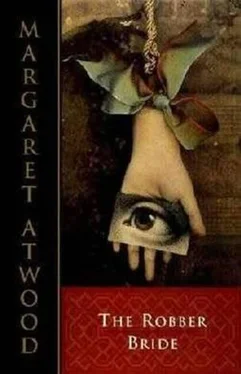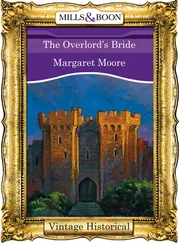Tony is down in the cellar, in the middle of the night, because she doesn’t feel like sleeping. She’s wearing her dressing gown and her wool work socks and her raccoon slippers, which are finally on their last legs, although they don’t have any legs and the legs they are on are hers. One of them has lost a tail, and they now have only one eye between them. Tony has become used to having eyes on her feet, like the eyes the ancient Egyptians painted on the prows of their boats. They provide extra guidance—extra spirit guidance, you might say—a thing Tony is coming to believe she needs. Maybe when these slippers kick the bucket she will buy some other ones, other ones with eyes. There’s a choice of animal: pigs, bears, rabbits, wolves. She thinks she will get the wolves.
Her sand-table map of Europe has been rearranged. Now it’s the second decade of the thirteenth century, and what will later be France is being torn apart by religious wars. By this time it’s no longer the Christians versus the Muslims: instead it’s the Catholics versus the Cathars. The dualist Cathars held that the world was divided between the forces of good and the forces of evil, the spiritual and the material, God and the Devil; they believed in reincarnation, and had female religious instructors. Whereas the Catholics ruled out rebirth, thought women unclean, and held by force of logic that since God was by definition all-powerful, evil was ultimately an illusion. A difference of opinion that cost many lives, though there was more at stake than theology, such as who was to control the trade routes and the olive crops, and the women, who were getting out of hand.
Carcassonne, stronghold of Languedoc and the Cathars, has just fallen to the bloodthirsty Simon de Montfort and his brutal army of crusading Catholics, after a siege of fifteen days and a failure of the water supply. Full-spectrum killing ensued. Tony’s main focus of interest is not Carcassonne, however, but Lavaur, which was attacked next. It resisted for sixty days under the leadership of the castle’s chatelaine, Dame Giraude. After the town finally succumbed, eighty knights were butchered like pigs and four hundred Cathar defenders were burned alive, and Dame Giraude herself was thrown down a well by de Montfort’s soldiers, with a lot of stones piled on top of her to keep her down. Nobility in war gets a name for itself, thinks Tony, because—there is so little of it.
Tony has chosen May 2, 1211, the day before the massacre. The besieging Catholics are represented by kidney beans, the defending Cathars by grains of white rice. Simon de Montfort is a red Monopoly man, Dame Giraude a blue one. Red for the cross, blue for the Cathars: it was their colour. Tony has already eaten several of the kidney beans, which strictly speaking she should not have done until after the battle. But nibbling helps her to concentrate. i
What was Dame Giraude thinking as she looked out over the battlements, assessing the enemy? She must have known that this battle was unwinnable, that her town and all the people—in it were doomed. Did she despair, was she praying for a miracle, was she proud of herself for having fought for what she believed in? Watching her co-religionists fry the next day, she must have felt that there was more evidence in support of her own theories of evil than of de Montfort’s.
Tony has been there, she has seen the terrain. She has picked a flower, some sort of tough-stemmed vetch; she has pressed it in the Bible, she has stuck it into her scrapbook, under L for Lavaur. She has bought a souvenir, a small satin pillow stuffed with lavender. According to the local residents, Dame Giraude is still there, still down in the well. That was all they could think of to do, in those days, with women like her: throw them into wells, or off steep cliffs or parapets—some unrelenting vertical—and watch them splatter. ,
Maybe Tony will write something about Dame Giraude, sometime. A study of female military commanders. Iron Hands, Velvet Gloves, she could call it. But there isn’t much material.
She doesn’t want to go on with this battle right now; she’s not in the mood for slaughter. She gets up from her chair and pours herself a glass of water; then, on top of Europe in the thirteenth century, she spreads out a street map, a map of downtown Toronto. Here is the Toxique, here is Queen Street, here is Roz’s renovated office building; here are the ferry docks, and the flat Island where Charis’s house still stands. Over here is the Arnold Garden Hotel, which is now a big clay-sided hole in the ground, a site of future development, because failing hotels go cheap and someone cut a good deal. Here is McClung Hall, and, to the north, Tony’s own house, with West in it, upstairs in bed, groaning gently in his sleep; with the cellar in it, with the sand-table in it, with the map on it, with the city in it, with the house in it, with the cellar in it, with the map in it. Maps, thinks Tony, contain the ground that contains them. Somewhere in this infinitely receding headspace, Zeriia continues to exist.
Tony needs the map for the same reason she always uses maps: they help her to see, to visualize the topology, to remember. What she is remembering is Zenia. She owes her this remembrance. She owes her an end.
Every ending is arbitrary, because the end is where you write The end. A period, a dot of punctuation, a point of stasis. A pinprick in the paper: you could put your eye to it and see through, to the other side, to the beginning of something else. Or, as Tony says to her students, Time is not a solid, like wood, but a fluid, like water or the wind. It doesn’t come neatly cut into evensized lengths, into decades and centuries. Nevertheless, for our purposes we have to pretend it does. The end of any history is a lie in which we all agree to conspire.
An ending, then. November 11, 1991, at eleven o’clock in the morning, the eleventh hour of the eleventh day of the eleventh month. It’s a Monday. The Recession is thickening, there are rumours of big-company bankruptcies, famine is rolling over Africa; in what was once Yugoslavia there is ethnic feuding. Atrocities multiply, leaderships teeter, car factories grind to a halt. The war in the Gulf is over and the desert sands are spackled with bombs; the oil fields still burn, clouds of black smoke roiling out over the greasy sea. Both sides claim to have won, both sides have lost. It’s a dim day, wreathed in mist.
The three of them stand at the back of the ferry as it churns its way through the harbour, outbound towards the Island, trailing the momentary darkness of its wake. From the mainland they can hear, faintly, the sound of bugles, and of muffled shots. A salute. The water is quicksilver in the pearl-coloured light, the wind is slight, cool, but mild for the time of year, the month. The pause month, the month of empty branches and held breath, the fog month, the greyish hush before winter.
Month of the dead, month of returning, thinks Charis. She thinks of the grey weeds waving, under the poisonous, guileless water, at the bottom of the lake; of the grey fish with lumpy chemical growths on them, wafting like shadows; of the lamprey eels with their tiny rasping teeth and sucking mouths, undulating among the husks of wrecked cars, the empty bottles. She thinks of everything that has fallen in, or else been thrown. Treasures and bones. At the beginning of November the French decorate their family graves with chrysanthemums, the Mexicans with marigolds, making a golden path so the spirits can find their way. Whereas we go in for poppies. The flower of sleep and forgetting. Petals of spilled blood.
Each one of them has a poppy stuck into the front of her coat. Flimsy plastic but who can resist, thinks Roz, though she liked the cloth ones better. It’s like those awful daffodils for cancer, pretty soon every single flower will be hooked up with some body part or disease. Plastic lupins for lupus, plastic columbines for colostomies, plastic aspidistras for AIDS, you have to buy the darn things though, it protects you from getting hit up every time you walk out the door. I have one already. See?
Читать дальше












